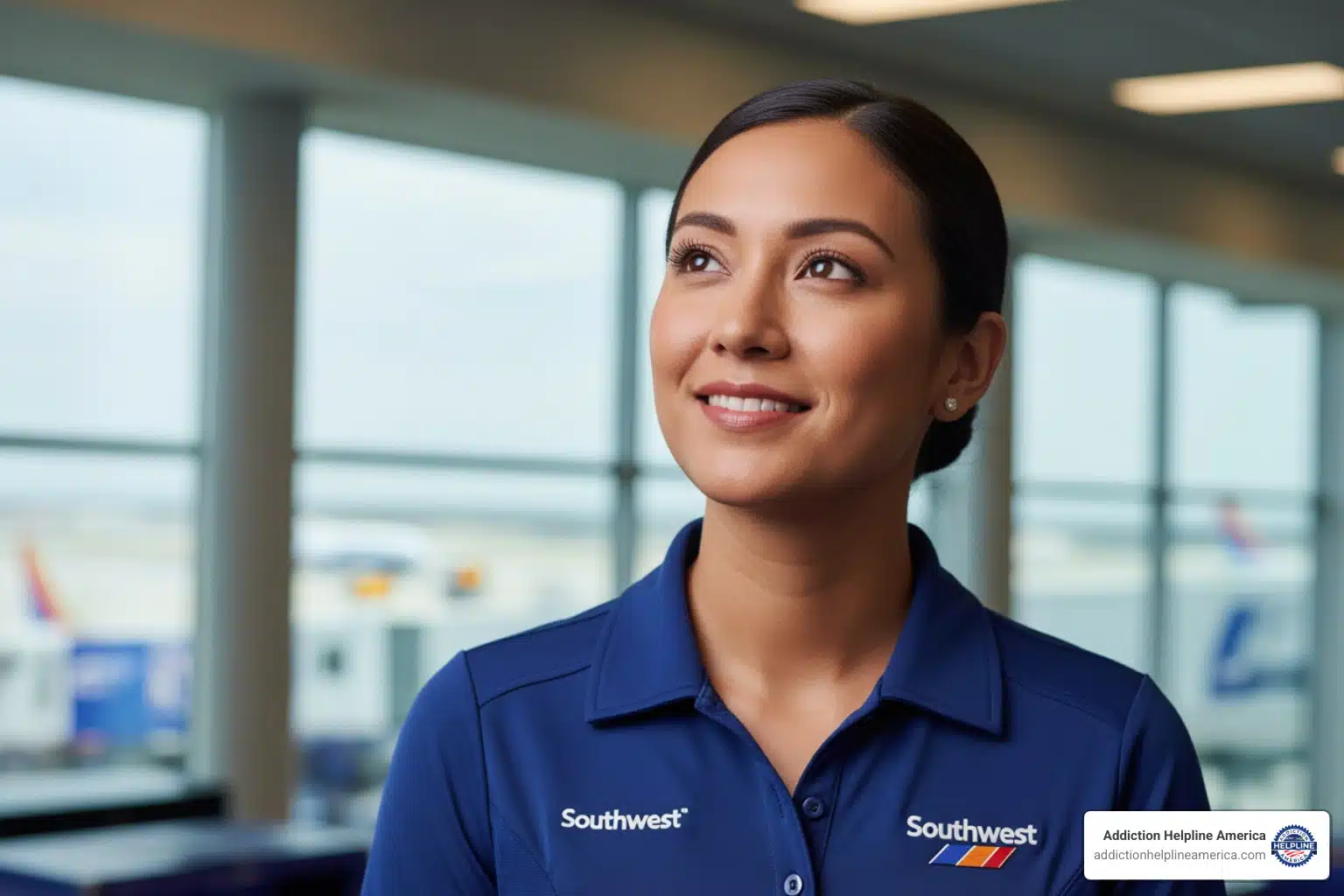
Why Recovery Matters for Southwest Airlines Employees
Drug & Alcohol Rehab for Southwest Airlines Employees is a vital resource for those navigating the pressures of the aviation industry. If you or a loved one is struggling, know that recovery is possible and supported. Here’s a brief overview:
- Confidential Support: Southwest’s Employee Assistance Program (EAP), ClearSkies, offers 8 free counseling sessions and referrals.
- Flexible Treatment: Options include outpatient, virtual (VIOP), partial hospitalization (PHP), residential, and detox services, many of which accommodate work schedules.
- Job Protection: The ADA and FMLA provide legal protections for employees seeking addiction treatment.
- Specialized Programs: Pilots have HIMS (Human Intervention and Motivational Study) and flight attendants have FADAP (Flight Attendant Drug and Alcohol Program).
The demanding nature of airline work—irregular schedules, high stress, and time away from home—can increase the risk of substance use. Statistics show that 10 to 12 percent of flight attendants engage in substance misuse, while many also face anxiety (37%) and depression (45%).
Southwest’s culture of “Heart” extends to supporting employees through these challenges. At Addiction Helpline America, we specialize in connecting aviation professionals with confidential Drug & Alcohol Rehab for Southwest Airlines Employees. We’re here to guide you toward recovery while protecting your career.
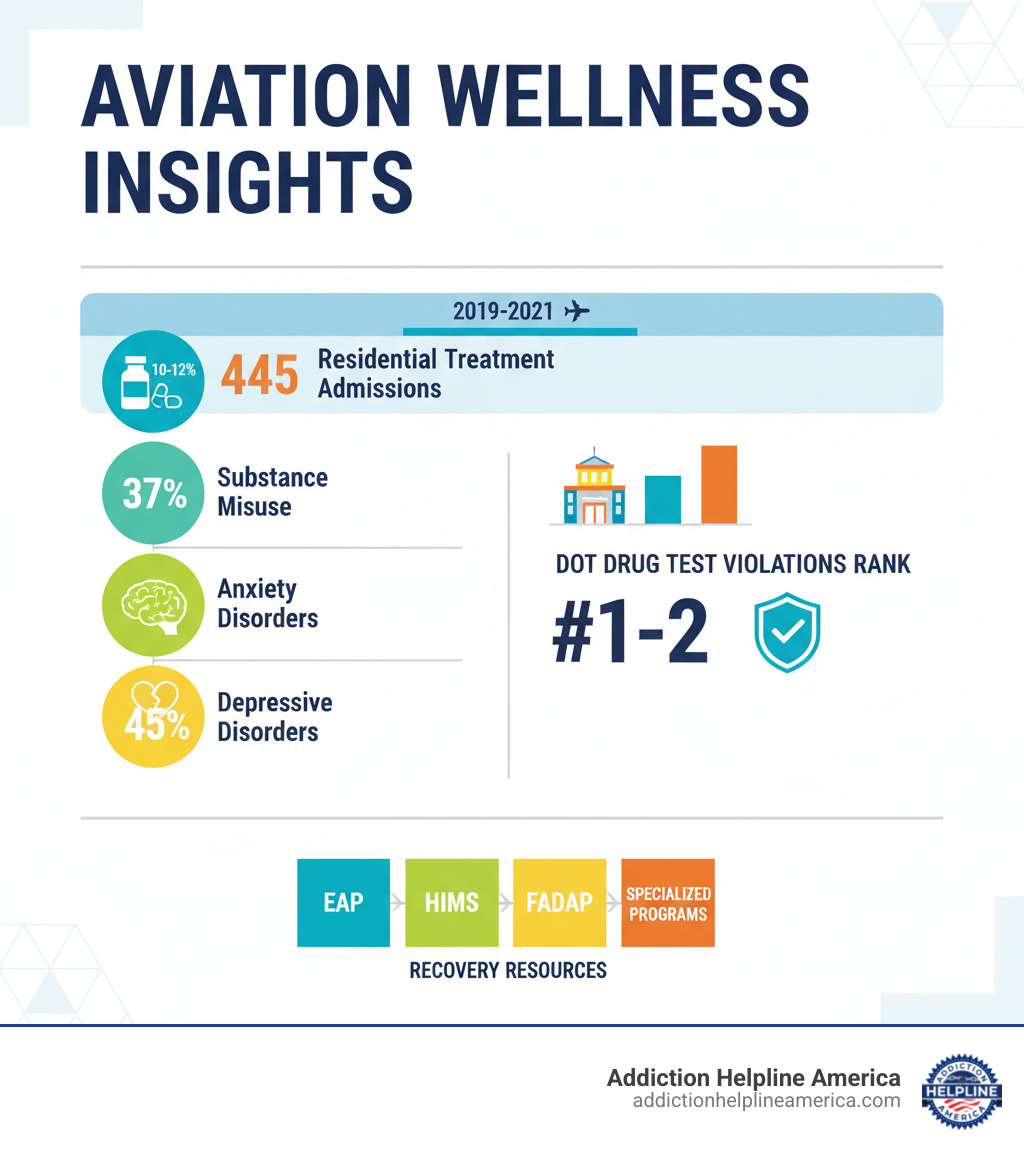
Understanding the Unique Pressures on Southwest Employees
While Southwest’s “Heart” culture is genuine, airline jobs are uniquely demanding. The combination of irregular schedules, a high-stress environment, and constant time away from home creates significant pressure. This relentless cycle can lead to physical and mental exhaustion, with employees facing burnout, fatigue, jet lag, and isolation from their support networks. When faced with such ongoing stress, some may turn to substances for relief. As explained in our guide on Why People Become Addicted to Drugs, this is often an attempt to cope with difficult circumstances. Recognizing these pressures is the first step toward finding healthier solutions.
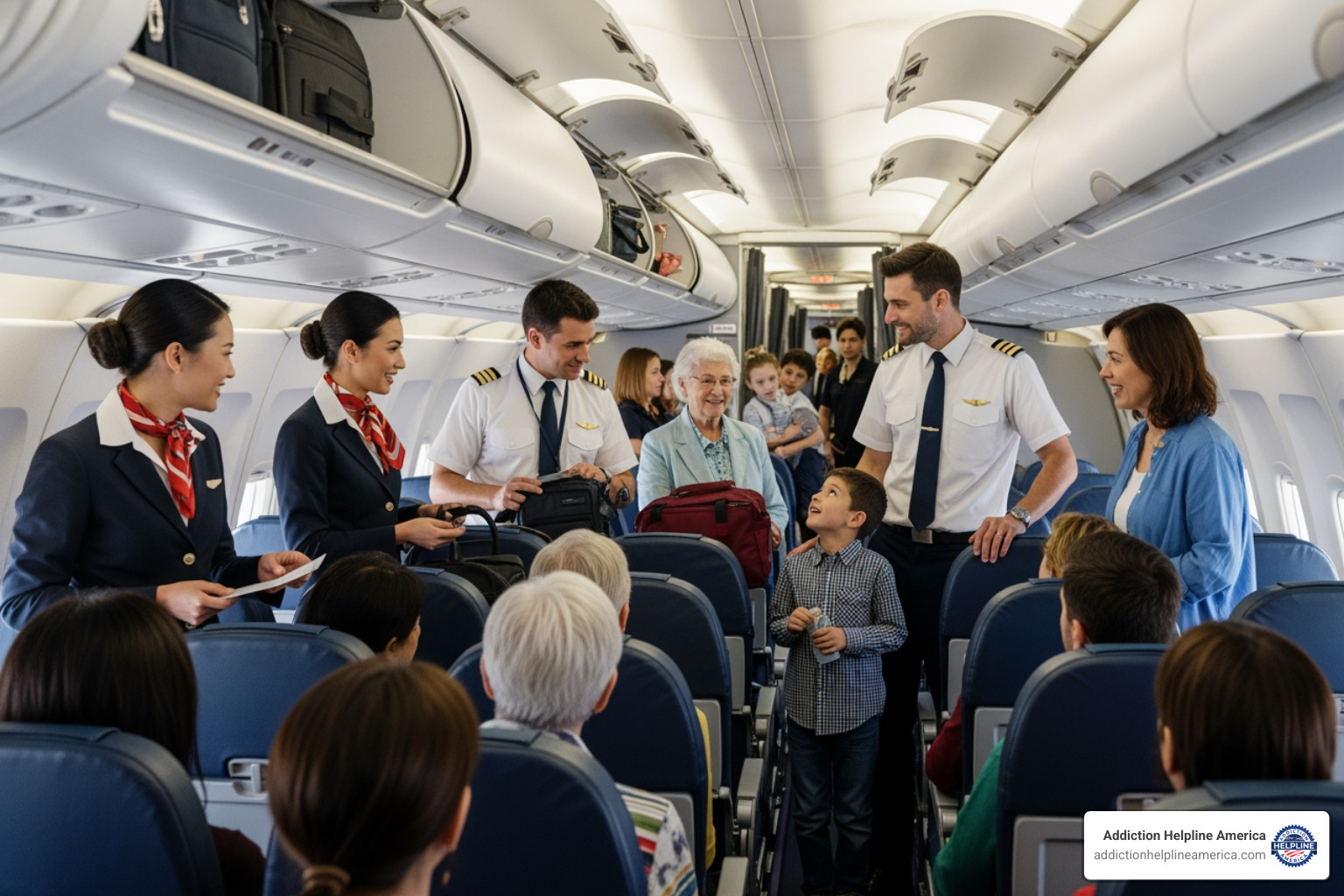
Signs and Symptoms of Addiction
Recognizing addiction can be difficult, as signs often start subtly. Be aware of these changes in yourself or a colleague:
- Behavioral: Increased secrecy, social withdrawal, loss of interest in hobbies, and risky behaviors.
- Physical: Changes in appearance or grooming, unexplained weight changes, bloodshot eyes, slurred speech, or withdrawal symptoms like tremors and nausea when not using.
- Psychological: Heightened anxiety, depression, irritability, mood swings, and denial about the extent of substance use.
- Work-Related: Frequent absences, tardiness, decreased productivity, conflicts with coworkers, and disregard for safety protocols.
- Relational: Growing distance from loved ones, frequent arguments, and broken promises.
If these signs are familiar, it’s time to seek Professional Addiction Help. Early intervention is key to protecting both your health and career.
The Link Between Mental Health and Substance Use
The demanding nature of airline work can trigger or worsen mental health conditions, leading to co-occurring disorders where addiction and mental illness are intertwined. High rates of anxiety and depression among aviation professionals highlight this link. Many people turn to substances in an attempt at self-medication—using alcohol to quiet anxiety or stimulants to fight fatigue. However, this creates a dangerous cycle where the substance worsens the underlying mental health issue, leading to dependence. Effective Drug & Alcohol Rehab for Southwest Airlines Employees must treat both the addiction and any co-occurring mental health conditions simultaneously. Promoting Mental Health Awareness is crucial to encourage employees to seek help before turning to substances.
A Guide to Drug & Alcohol Rehab for Southwest Airlines Employees
If you’re a Southwest employee struggling with substance use, you don’t have to choose between your health and your career. Modern Drug & Alcohol Rehab for Southwest Airlines Employees is designed with your needs in mind.
- Treatment Flexibility: Programs offer evening, weekend, and virtual options to fit unpredictable airline schedules.
- Maintaining Employment: It is often possible to continue working while receiving care through flexible programs.
- Confidentiality: Your privacy is protected by federal laws like HIPAA. Your employer and coworkers will not be notified.
- Personalized Care: Quality treatment includes Customized Treatment Plans that address your specific stressors, substance use history, and any co-occurring mental health conditions.

Types of Rehab Programs Available
Understanding your options is the first step. Drug & Alcohol Rehab for Southwest Airlines Employees is available in several formats:
- Inpatient Drug Rehab Programs: Live-in treatment providing 24/7 support in a substance-free environment, ideal for severe addiction. This typically requires taking FMLA leave.
- Outpatient Rehab Programs: Attend scheduled therapy sessions while living at home, allowing you to maintain work and family commitments.
- Virtual Intensive Outpatient Programs (VIOP): A game-changer for aviation professionals, offering intensive therapy via secure video platforms from any location.
- Intensive Outpatient Programs (IOP): More structured than standard outpatient, with 9-12 hours of therapy weekly while you live at home.
- Partial Hospitalization Programs (PHP): A high level of care with all-day treatment sessions five days a week, returning home at night.
- Detox Programs Near Me: The first step for many, providing safe, medically supervised withdrawal from substances like alcohol or opioids.
- Sober Living Homes: Structured, substance-free housing that supports the transition from formal treatment back to daily life.
Addiction Helpline America can help you determine the right level of care for your situation.
How to Access Rehab and Start the Process
Starting the process is more straightforward than you might think. There are several confidential ways to get help:
- Self-Referral: The most direct path. You can call Addiction Helpline America for a confidential consultation to explore your options. This is your chance to Get Help for Drug Addiction on your own terms.
- Peer Referral: Connect with colleagues who have been in your shoes. Flight attendants can use the Flight Attendant Drug and Alcohol Program (FADAP), and pilots can access the Human Intervention and Motivational Study (HIMS) program for peer support.
- EAP Referral: Contact Southwest’s ClearSkies program for up to 8 free, confidential counseling sessions and referrals to specialized treatment. Your employer is not notified.
Once you connect with a provider, you’ll undergo a confidential assessment. This conversation with a clinical professional helps determine the most appropriate level of care for your unique needs, ensuring you get the right support from day one.
Call Now – Your Journey to Recovery Begins Today!

Take the first step towards a healthier life! Call now to connect with our compassionate team and start your recovery journey today. Your path to healing awaits!
Our recovery specialists are available 24/7 to provide support, and all calls are confidential and free. Reach out anytime – we’re here to help!
Leveraging Southwest Airlines’ Support Systems for Recovery
Southwest Airlines’ “People First” culture, highlighted on its Southwest Careers page, extends to helping employees with substance use challenges. The airline provides specific programs and support systems to help you access Drug & Alcohol Rehab for Southwest Airlines Employees confidentially while protecting your career. Understanding these resources is key to seeking help without fear.
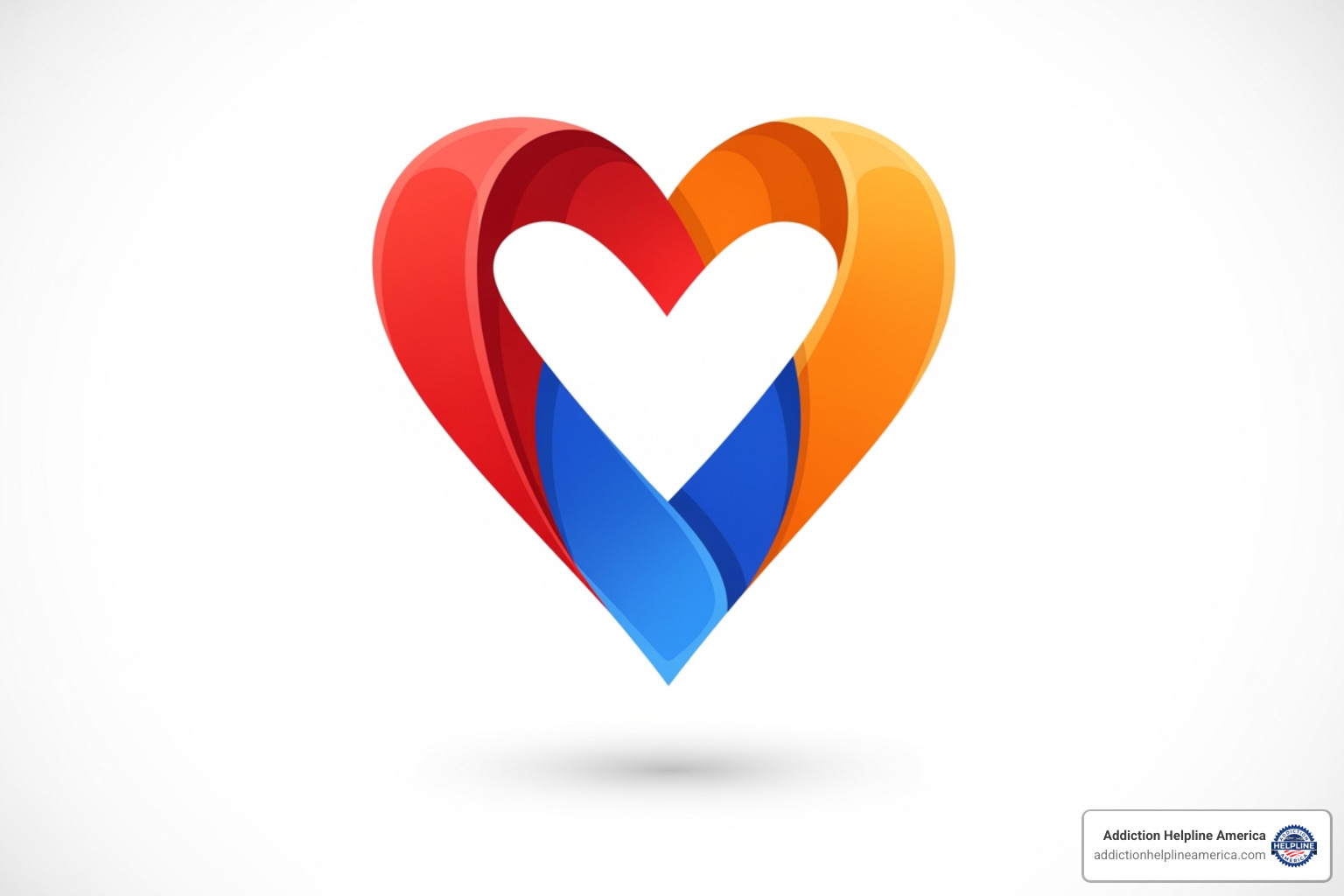
The Role of the Employee Assistance Program (EAP)
Southwest’s Employee Assistance Program, ClearSkies, is your confidential first line of support. It is designed to help you, not get you in trouble. Your conversations are protected by privacy laws, and your employer is not notified.
Call ClearSkies at 1-800-742-8911 or visit www.liveandworkwell.com (access code: swa7370) for eight free counseling sessions. EAP counselors will assess your needs and refer you to appropriate treatment. As research on EAPs shows, these programs are effective gateways to professional help without jeopardizing your job.
Insurance Coverage for Drug & Alcohol Rehab for Southwest Airlines Employees
A major concern for many is cost. Fortunately, Southwest Airlines provides an excellent benefits package with substantial coverage for substance abuse treatment. Most employees have insurance through providers like Aetna or Cigna, which generally cover all levels of care, from detox to inpatient rehab.
The first step is verifying your benefits to understand your deductible, co-pays, and any pre-authorization requirements. This can be complex, but we can help. Addiction Helpline America can verify your insurance and explain your coverage in simple terms. Your ClearSkies EAP counselor can also help you find in-network providers.
Our guide on How to Find Rehab Programs That Accept Insurance provides more detail. We work with a nationwide network of centers that accept major insurance, ensuring you can find quality Drug & Alcohol Rehab for Southwest Airlines Employees covered by your benefits.
Consequences and Job Protection in Safety-Sensitive Roles
The aviation industry has strict, zero-tolerance policies for substance use in safety-sensitive roles. The Department of Transportation (DOT) and Federal Aviation Administration (FAA) mandate immediate removal from duty for a positive test. Southwest’s policy is even stricter, with a breath alcohol concentration of 0.042 or greater resulting in termination. Testing can be random, post-accident, or based on reasonable suspicion. It’s also crucial to know that medical marijuana is NOT a valid excuse under federal rules, regardless of state law.
While the consequences of a violation are severe, proactively seeking help offers significant job protection.
- The Americans with Disabilities Act (ADA) treats addiction as a disability, protecting you from discrimination for seeking treatment as long as you can perform your job. Learn more about The ADA, addiction, recovery, and employment.
- The Family and Medical Leave Act (FMLA) allows eligible employees up to 12 weeks of unpaid, job-protected leave for treatment.
Seeking help through your EAP before a policy violation occurs is always the best path. It demonstrates a commitment to safety and recovery. For those who do violate policy, a structured return-to-duty process exists, but taking initiative provides the strongest protection for your career.
Ensuring a Safe Landing: Aftercare and Role-Specific Support
Completing rehab is the beginning of your recovery journey. Aftercare provides the ongoing support needed to maintain sobriety while navigating the pressures of airline work. Key components include:
- Sober Living Homes: Structured, substance-free housing that helps ease the transition back to independent life.
- 12-Step Programs: Groups like Alcoholics Anonymous (AA) and Narcotics Anonymous (NA) offer free, community-based peer support. Learn more about the 12 Step Program.
- Ongoing Therapy: Individual or group Therapy in Addiction Recovery helps you continue to develop coping skills and manage underlying issues.
- Peer Support Groups: Specialized groups for professionals provide a unique space to connect with others who understand your career pressures.
Building a strong sober support network is essential for managing Addiction Triggers and sustaining long-term recovery.
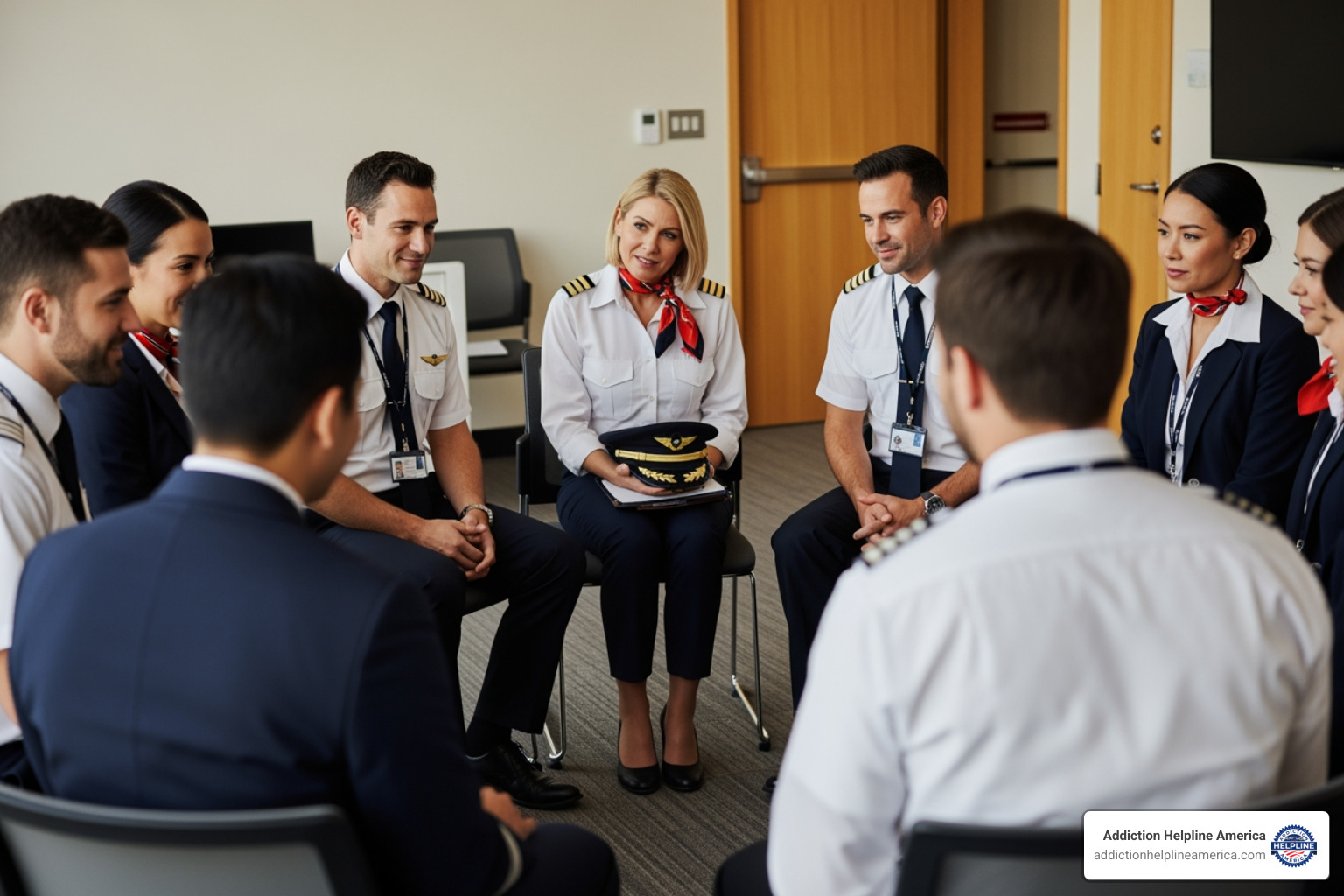
Specialized Resources for Pilots, Flight Attendants, and Ground Crew
The aviation industry provides specialized resources to support employees in recovery, recognizing that a supported employee is a safe employee.
- HIMS for Pilots: The Human Intervention and Motivational Study is an FAA-approved monitoring program that has helped thousands of pilots return to the cockpit safely after treatment. It involves a team approach and peer support. More information is available through Aviation Family Network support.
- FADAP for Flight Attendants: The Flight Attendant Drug and Alcohol Program is a peer-led support system funded by the FAA. It provides confidential guidance from fellow flight attendants who are in recovery themselves. Learn more from the FADAP program information.
- Union Support: Unions like the Transport Workers Union (TWU) often have representatives and programs to assist members with substance use issues.
- Aviation Family Network: This organization offers confidential resources for aviation professionals and their families, recognizing that addiction impacts everyone.
These programs prove that recovery and a successful career in aviation can go hand-in-hand.
Call Now – Your Journey to Recovery Begins Today!

Take the first step towards a healthier life! Call now to connect with our compassionate team and start your recovery journey today. Your path to healing awaits!
Our recovery specialists are available 24/7 to provide support, and all calls are confidential and free. Reach out anytime – we’re here to help!
Frequently Asked Questions about Rehab for Southwest Employees
Navigating recovery and your career brings up questions. Here are answers to some common concerns about Drug & Alcohol Rehab for Southwest Airlines Employees.
Can I be fired for seeking help for a substance use disorder?
No, proactively seeking help is a protected activity. Federal laws like the Americans with Disabilities Act (ADA) and the Family and Medical Leave Act (FMLA) offer job protections for employees who seek treatment for a substance use disorder. Using your confidential Employee Assistance Program (EAP) will not jeopardize your job. You can learn more about The ADA, addiction, and employment rights.
Is my treatment confidential?
Yes, absolutely. Your privacy is protected by strict federal laws, including the Health Insurance Portability and Accountability Act (HIPAA). Your EAP, counselors, and treatment providers cannot share your personal health information with your employer without your explicit written consent. Confidentiality is a cornerstone of effective treatment.
Can I continue working while in rehab?
Yes, in many cases. Flexible treatment options are designed for working professionals. Outpatient programs, Intensive Outpatient Programs (IOP), and especially Virtual Intensive Outpatient Programs (VIOP) allow you to receive high-quality care while maintaining your work schedule. These programs offer therapy sessions that can fit around your shifts and travel.
Call Now – Your Journey to Recovery Begins Today!

Take the first step towards a healthier life! Call now to connect with our compassionate team and start your recovery journey today. Your path to healing awaits!
Our recovery specialists are available 24/7 to provide support, and all calls are confidential and free. Reach out anytime – we’re here to help!
Conclusion
If you are a Southwest Airlines employee struggling with substance use, recovery is an achievable goal. The unique pressures of your job are real, but so are the comprehensive support systems available to you. Southwest’s “Heart” culture is backed by concrete resources like the confidential ClearSkies EAP, specialized programs like HIMS and FADAP, and job protections under the ADA and FMLA.
Flexible treatment options, covered by your benefits package, are designed to work with your schedule, not against it. You do not have to choose between your health and your career.
Taking the first step is the most powerful one you can make. The fear and uncertainty are understandable, but a healthier future is possible. Your career can continue, your relationships can heal, and the weight of addiction can be lifted.
At Addiction Helpline America, we provide free, confidential guidance to connect you with the right treatment program from our nationwide network. We understand the aviation industry and are here to help you steer your path to recovery. Visit our Find the Right Rehab Facility Guide or call us today for immediate support. You’ve helped countless passengers reach their destinations; let us help you reach yours.
Our helpline is 100%
free & confidential
If you or someone you care about is struggling with drug or alcohol addiction, we can help you explore your recovery options. Don’t face this challenge alone—seek support from us.
Programs
Resources
Will my insurance
cover addiction
treatment?
We're ready to help
Find the best
drug or alcohol treatment
center
Are you or a loved one struggling with addiction? Call today to speak to a treatment expert.















